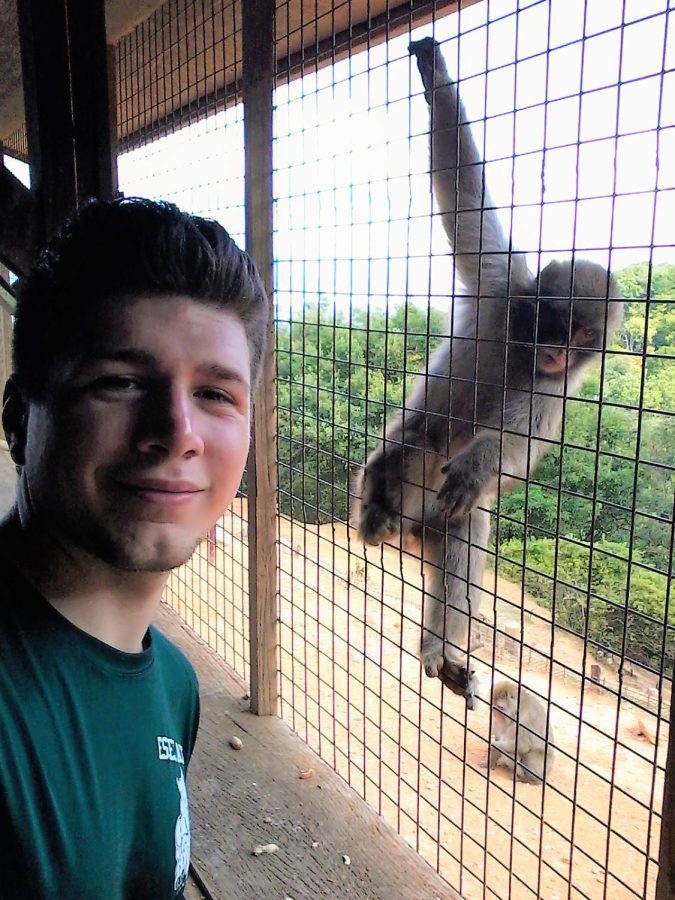Kent State anthropology department receives NSF grant for primate research
The Kent State anthropology department has been awarded a $298,000 National Science Fund grant to continue research collaborations with the Primate Research Institution in Kyoto Japan.
“It’s a program to give our graduate students a series of benefits,” Anthony Tosi, an anthropology professor overseeing the project, said.
The program is a three-year NSF grant that will fund internships for the next years for students to study abroad.
The grant is an expansion of a smaller program that began in 2015, which funded one student each summer and two students in the summer of 2019.
Kyoto University’s Primate Research Institute is considered a leading international primate research center, with an expansive lab, including live primates and 10,000-piece skeletal collection as well as access to experts field.
“They are going straight to the top and these faculty some of the best in their field” Tosi said. “(Students) have access to well-known individuals at one of the best centers in the world in terms of primate research.”
Tosi explain there are experts from all different angles working in the primate lab of Kyoto for students to use as resources.
“Students learn new techniques, have access to new facilities, live primates and a large biomaterials library,” Tosi said. “If you can think of any evolutionary question and you want to use a non-human primate model you can do that there.”
Tosi explained students have worked with Kyoto faculty to publish papers on separate research projects all within the theme of human evolution or biomedical studies.
“Our students and faculty are building collaborative projects and I think the Japanese researches are happy to see a product from their research,” Tosi said. “Also, they welcome the fact that they are bringing foreigners into the laboratory because that introduces more exposure to their counterparts in American science.”
Tosi said building international relations in science research is an important process promoted through the program
“Students are building international collaborators early in their career,” Tosi said. “That can take decades.”
Science is different in different cultures and it is important to understand Japanese culture to work efficiently within international labs. Tosi explained processes such as requesting samples and speaking with professors operate differently in the Japanese research labs and it’s important and beneficial for students to learn and adapt to these differences.
“They are gaining this new perspective of how things operate differently from the United States,” Tosi said. “They are meeting new people and working in new labs, they are in the trenches with them. We are all learning together.”
All research projects fall under the umbrella of evolutionary studies, but students can choose what specific aspect they want to explore.
“The doors are open for our students to do skeletal studies, neuroscience studies, genetics studies, physiology studies, behavioral studies,” Tosi said. “The only theme is using non-human primates as models for human evolutionary and biomedical research.”
Cellular biology graduate student Cody Ruiz studied in Kyoto in the summer of 2016 after being awarded a grant through NSF’s East Asia and Pacific Science Institution and will be going back in the summer of 2020.
“The research is amazing,” Ruiz said. “I’ve never seen an institute with so many resources and a large international component.”
Ruiz was led by Kyoto University assistant professor of cellular and molecular biology Masanori Imamura studying Japanese macaques looking at the sperm production fluctuations within males during their reproductive seasons. Ruiz will continue this research with Imamura conducting sample collections and analysis upon returning in the summer.
Ruiz said he learned and used techniques that he’d never done before like RT PCR, which is using reverse transcriptase to turn RNA into complementary DNA and then measure the amount of DNA in a sample.
“The molecular biology lab is very efficient,” Ruiz said. “There is a good team approach the whole summer everyone was always working together. I tried to bring that aspect back to Kent State, I think it’s underappreciated in the US.”
Ruiz said the experience gave him an appreciation for the Japanese culture
“In terms of seeing a brand new culture, I developed a strong affinity and love for the Japanese culture,”Ruiz said. “It’s a really nice blend of modern and industrial and tech savvy with deep historical and traditional aspect underpinning everything.”
Ruiz explained ancient temples and Buddhist temples sit within cityscapes, where they learned about the extensive history of the Japanese culture. Ruiz also said the Japanese cuisine is the best he’s had.
Tosi explained students also gain confidence through programs upon returning to Kent labs.
“Students come back brimming with confidence,” Tosi said. “Students who were quiet before are now contributing a lot more in their lab meetings. They have done something totally different and succeeded. It’s been transformative for our students.”
Tosi, who has guest lectured at Kyoto, plans to continue and grow the collaboration with Kyoto University to further international networking opportunities for students.
“Different ideas can pop up from anywhere in the world and we can all benefit from exchange of ideas,” Tosi said.
“We can communicate more and become more effective collaborators.”
Students can find more information on the program and applications on the anthropology website.
Contact Colleen Carroll at [email protected].



